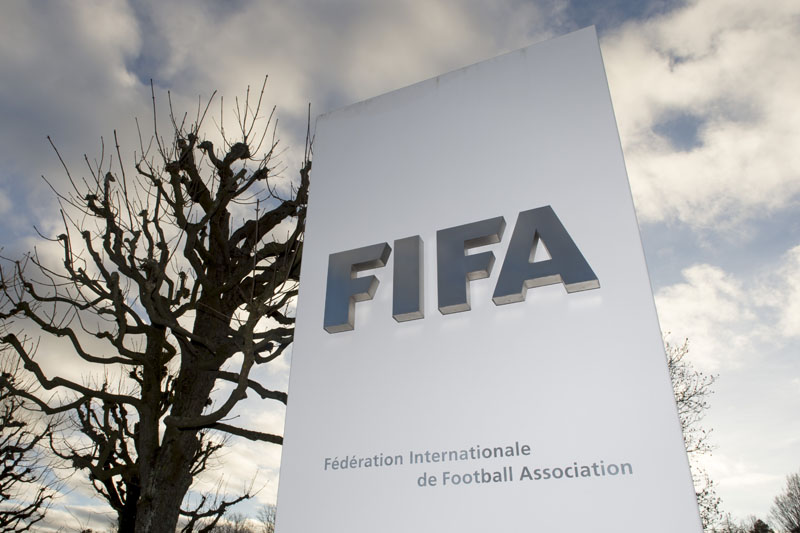Soccer's dark year: From bribery arrests to suicide attacks
LONDON: Dawn had just broken in Zurich when a man was spotted being dragged out of an opulent hotel's side entrance. Raising a single white sheet, hotel staff made an inadequate attempt to shield the guest being forced to check out early after being arrested in his bedroom.
Eduardo Li was in clear view on the quiet side street as he was bundled into an unmarked police car, one of seven FIFA officials arrested as Swiss police swooped on the Baur au Lac hotel at the behest of American authorities.
Years of investigations into soccer corruption burst into public view on the morning of May 27 as the so-called "World Cup of fraud" was exposed and FIFA would be coerced into cleaning up its act.
Li, the Costa Rican federation president who was in Zurich expecting to join FIFA's elite executive committee, was a lesser-known target of the US case. But his arrest, which was captured on video by The Associated Press, was the most visible.
By the end of 2015, four FIFA vice presidents had been indicted in the United States, including two swept up in a second wave of arrests in December after being chosen to replace those from the Americas indicted in May.
A fifth VP, Michel Platini, was banished by FIFA from soccer until 2023 along with Sepp Blatter the man he was expected to succeed as president after their dealings became the subject of a Swiss criminal case.
After 40 years at FIFA, 17 as president, the reign of the seemingly immovable Blatter ended in disgrace in 2015. Few lamented his downfall.
The 79-year-old Blatter did not see it coming in February when he beamed: "Now you see why I am happy" as he relaxed in a Northern Ireland hotel accompanied by a girlfriend almost 30 years his junior at a FIFA meeting.
And Blatter managed to brush off the anger that greeted revelations about the scale of bribery and kickbacks corruption that mostly occurred within confederations rather than involving FIFA HQ in Zurich to be voted in for a fifth term by federations on May 29.
Batter subjected himself to a bruising encounter with the media the next day, a Saturday morning when he was asked whether some of the accusations were indicative of his "incompetence or intentional negligence."
Blatter was defiant, vowing to see out his four-year term. The bravado quickly evaporated.
"Then came the different information from the US with this and that," Blatter aide Walter Gagg told the AP.
After being warned in meetings with associates that he could be the next FIFA executive in the prosecutors' sights, Blatter stunned the world on Tuesday June 2 by announcing plans to resign, accepting he lacked the game's backing.
Blatter hoped to hand over power in February, but the Swiss attorney general intervened by raiding FIFA's HQ in September and questioning the president.
Years of suspicions about Blatter's integrity were confirmed when he was banished by FIFA's ethics judge for unethical conduct over a financial transaction with Platini, who received the same eight-year ban from soccer.
The Swiss investigation like the parallel American case will continue into 2016 as trials begin and more officials fear their illicit profiteering from sporting contracts is uncovered. At the same time, FIFA will implement reforms designed to clean up the organization and elect a new president on Feb. 26.
Perhaps what surprised soccer fans in 2015 as much as the arrests was the interest of US Attorney General Loretta Lynch in such sleaze.
But the significant role the world's most popular sport plays in the US was confirmed not only by Lynch but by Americans at, of all things in this year, a FIFA event. When the US won a third Women's World Cup title in July, the victory over Japan was watched by more than 25 million American television viewers.
The wrong side of passion for soccer in the US was also displayed this year when the AP filmed fans from New York rivals City and Red Bulls clashing before their derby in New Jersey in August, hooliganism previously associated with European supporters.
One of the enduring images, though, of a soccer year scarred by wrongdoing was of the game's ability to provide a powerful platform for unity after becoming a target for Islamic extremists in last month's Paris attacks.
After France's match against Germany at the Stade de France was targeted by suicide bombers, who failed to enter the stadium, the French team traveled to England for the friendliest of friendly games.
The fixture was overshadowed by a sense of grief but also of fraternity as the Wembley Stadium arch was lit in the blue, white and red of the French flag and the national anthem was sung by both sets of fans.
But amid the display of friendship was a realization that stadiums were now targets. Security was quickly beefed up across Europe and the heightened state of alert led to high-profile games being called off.
Soccer's most pressing concern in 2016 will remain ensuring the safety of fans and players, particularly with France hosting the first 24-team European Championship in June and July.
The showpiece event, along with the US-hosted Copa America Centenario, will also offer soccer's stars a chance to remind people why it's the world's favorite game - rather than a source of corruption.






